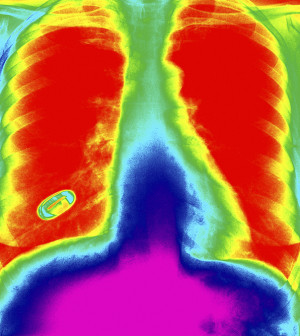- Could Your Grocery Store Meat Be Causing Recurring UTIs?
- Are You Making This Expensive Thermostat Error This Winter?
- Recognizing the Signs of Hypothyroidism
- 10 Strategies to Overcome Insomnia
- Could Artificial Sweeteners Be Aging the Brain Faster?
- Techniques for Soothing Your Nervous System
- Does the Water in Your House Smell Funny? Here’s Why
- Can a Daily Dose of Apple Cider Vinegar Actually Aid Weight Loss?
- 6 Health Beverages That Can Actually Spike Your Blood Sugar
- Treatment Options for Social Anxiety Disorder
Immunotherapy Not a Quick Fix for Hay Fever

Immunotherapy — often in the form of allergy shots — can combat the runny nose, itchy eyes, congestion, sneezing and sinus pressure of persistent hay fever. But it can’t be done in less than three years, British researchers report.
Two years of immunotherapy was only as effective as a placebo, the study authors said.
The key, the researchers added, seems to be a third year of treatment.
“Immunotherapy for hay fever [allergic rhinitis] involves receiving a high dose of grass pollen vaccine either as a monthly injection or as a daily pill placed under the tongue,” said lead researcher Dr. Stephen Durham. He is a professor of allergy and respiratory medicine at Imperial College London in England.
About 15 percent of Americans suffer from diagnosed hay fever, and 30 percent report having symptoms of hay fever, which can negatively affect quality of life and sleep. It can also have an impact at work and school, the researchers said.
For many patients, over-the-counter or prescription medications aren’t effective in relieving symptoms, Durham said.
“Some 50 percent of sufferers find current tablets and nasal sprays either ineffective or [have] unacceptable side effects,” he said. “Grass pollen immunotherapy is highly effective and needs to be given for three years for long-term remission of hay fever.”
The report was published Feb. 14 in the Journal of the American Medical Association.
One specialist thinks doctors should offer patients the option of immunotherapy for hay fever.
“If it were me, and I heard there was a treatment that could replace my sprays and pills for the next 20 years, I want to know I have that choice,” said Dr. Linda Cox. She is assistant clinical professor of medicine at the University of Miami Miller School of Medicine.
People with hay fever are going to be taking drugs such as nasal sprays and antihistamines, and will probably end up seeing a specialist and missing a few days of work, she said.
“So if three years of treatment can knock this out and prevent your 20-plus years of antihistamines and nasal spray, it is worth it. And it does pay for itself,” said Cox, who authored an accompanying journal editorial.
Immunotherapy is covered by insurance, and patients can be treated starting two months before and during hay fever season or year round, she said.
Immunotherapy drugs to treat other allergies are being developed, Cox said. For example, in Europe, therapy for dust mites is already in use and may be available soon in the United States.
For the study, Durham and his colleagues randomly assigned 106 adults with moderate-to-severe seasonal hay fever to two years of immunotherapy or an inactive placebo. The treatment groups took either a daily pill containing the grass called Phleum or monthly injections of Phleum.
To judge the effectiveness of the treatment, the patients were exposed to the grass before treatment, and at one and two years of treatment, and a year after treatment ended.
Among the 92 patients who completed the study, the researchers found that two years of treatment weren’t enough to show an improvement at the third year of follow-up.
If two years of therapy had worked, it would have been less expensive and more convenient for patients, Durham said. “Immunotherapy is highly effective when given either as tablets or injections, but needs to be given for at least three years for long-term benefits,” he said.
More information
To learn more about hay fever, visit the American College of Allergy, Asthma and Immunology.
Source: HealthDay
Copyright © 2026 HealthDay. All rights reserved.










